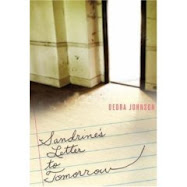It's an honor to be read like this.
A child at the crossroads Innocence, awareness intertwine in Dedra Johnson debut
Sandrine's first escape route comes through the books she reads voraciously, among them "Little House on the Prairie," "A Wrinkle in Time" and "Watership Down." She also reads biographies of Frederick Douglass, Mary McLeod Bethune and Harriet Tubman. She defines herself through the words of writers and the lives of historical icons, and she uses these lessons to find her own voice. In keeping with Tubman's example, Sandrine and her classmate Lydia, also an abuse victim, become an Underground Railroad for one another:
Lydia showed me how to hold keys in my hand with the points sticking out, a sharp fist to scratch, poke or punch with. I told her the back ways we took to school and she said I was smart, that she hadn't thought of it.
Johnson lets objects and moments tell their own stories when she shows the reader a blurred Polaroid of a mystery woman on the mantle and a jar of Mamalita's pomegranate jelly. She also writes of Catholic schoolchildren who wear their house keys like rosaries. Johnson skillfully lets these scenes breathe and keeps the reader within the present-tense moment. The effect pays off. There is no adult Sandrine looking back, putting her childhood in perspective. Johnson shows her protagonist in real time, the questions in her life still intact and unanswered.
In one scene, Sandrine and her classmates make papier-maché American flags to celebrate the Bicentennial. Perhaps this image captures the essence of "Sandrine's Letter to Tomorrow," the story of a young girl crafting her independence. To that end, Sandrine draws upon lessons learned from the kindnesses and cruelties she has encountered in her young life. In a powerful debut effort, Johnson shows us how these acts affect the lives of children.
Ravi Howard, Mobile
Press-Register, March 2, 2008


